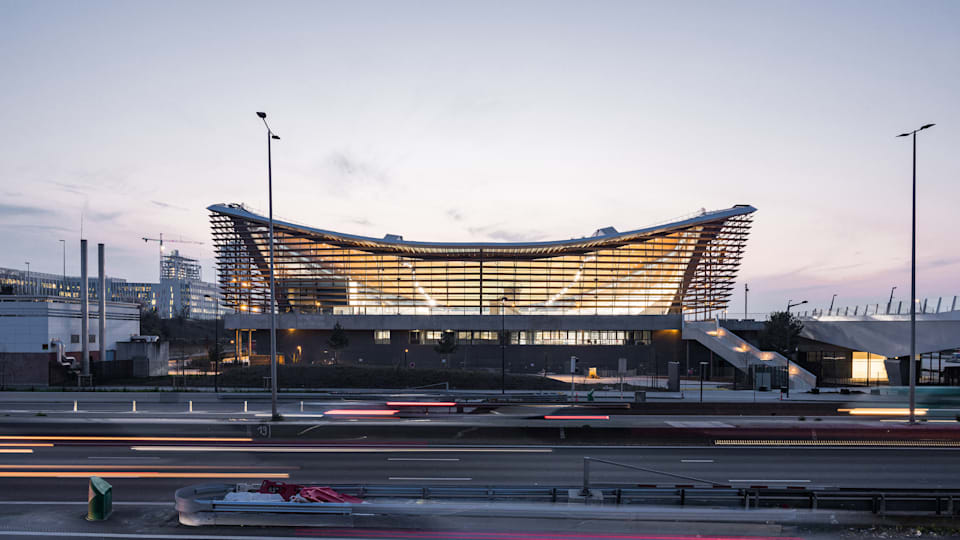The Aquatics Centre at the Paris 2024 Olympics: an example of eco-designed infrastructure and thought to ensure a lasting legacy

As the only facility entirely built for the Paris 2024 Olympic Games and after, the Aquatics Centre – based in Saint-Denis – has thought big with this eco-responsible infrastructure project. The venue, which will host artistic swimming, diving and water polo from July 27 to August 11, has made every effort to think about the facility's future.
In 2017, when Paris was chosen by the International Olympic Committee to host the Games, it was hard to imagine where the aquatic events would be held. While swimming found a home at La Defense Arena, artistic swimming, diving and water polo, like many other disciplines, are going to take place in the department of Seine-Saint-Denis.
Replacing a former industrial site, the work, led by the Greater Paris Metropolis, began in March 2020. Designed by the French architectural firm Ateliers 2/3/4 and the Dutch firm Venhoeven CS, the facility gradually took shape and construction – made by Bouygues Bâtiment Île-de-France – was completed at the end of 2023, with the first diving sessions taking place in March this year.
Chosen for its accessibility, the site is connected to the Stade de France by a walkway above the A1 motorway, and is close to the Olympic Village. The area is also very well served by public transport and by bicycle.
Find out more about the Aquatics Centre
Did you know?
While 95% of the venues at the Paris 2024 Games were existing or only going to be temporary, only the Olympic Aquatics Centre has asked to be built entirely. Located at the heart of the Plaine Saulnier mixed development zone, it was immediately the subject of a large-scale project, designed and imagined for the future.
This approach differs from the previous editions, with London having built 6 sites in addition to the Olympic Village, while Tokyo and Rio had to build 9 more.
The Aquatics Centre, an infrastructure that respects environmental issues
Olympic Aquatics Centre's construction is part of Paris 2024's vision to organise more responsible Games, with the aim of reducing by half its carbon emissions compared with previous editions. Since the first stone was laid in November 2021 in the presence of the Prime Minister of the time, Jean Castex, the site teams have conscientiously followed the architects' plans.
Among all this equipment, this includes a huge concave wooden framework, the size of which reduces the volume of air to be heated by 30%, and therefore energy requirements.
Interior fittings that favour low-carbon materials or materials that have been recycled are also used. Of the 5,000 seats in total in the stands, for example, 3,000 are entirely made in France, from locally collected and recycled plastic. This means that 30 tonnes of waste have found a new, sustainable life.
The pools will be kept at a constant temperature by recovering heat from the urban network, including a nearby data centre. Finally, the 5,000 m² roof is covered with photovoltaic panels, which cover at least 20% of electricity needs, making it one of the largest solar farms on a public building in the Île-de-France region.
Designed for the Paris 2024 Olympic Games, and after?
One of the most important aspects of the project was to ensure that the infrastructure could be reused by the general public. After the Games, the pools will be redeveloped to make up for the lack of sports facilities in the Seine-Saint-Denis department (one child out of two enters secondary school without knowing how to swim).
From July 2025, the grandstands will be halved (from 5,000 to 2,500 seats), and the pools will be reduced to two – one of 50 metres and the other of 25 metres – allowing the installation of a fitness area, a climbing gym, a five-a-side football pitch, a restaurant and a sports recycling centre.
The multi-purpose space, designed for families, schools and sports clubs, will also be used by the French Swimming Federation, which will use it as a high-level federal training centre so that its best athletes can benefit from this facility. It will also be used in the coming years as a venue for sporting competitions – including the European Swimming Championships in 2026. The diving boards, meanwhile, will remain to house the French diving centre.